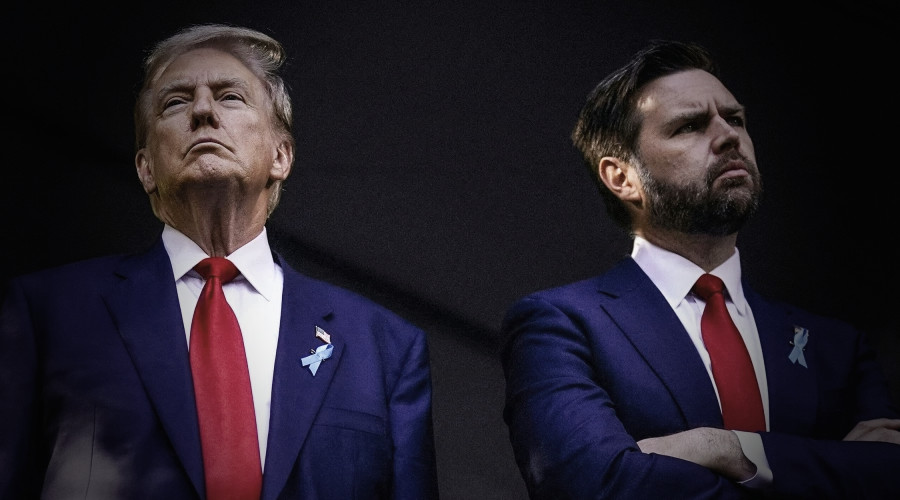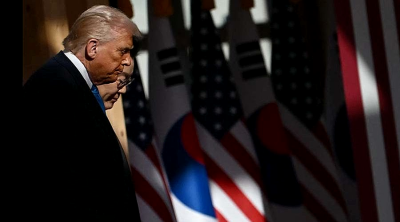
When US Vice President JD Vance declared that the escalating conflict between India and Pakistan is “none of our business,” it was not a slip of the tongue.
It was a deliberate articulation of the new American doctrine under President Donald Trump’s second term: one defined by insouciance and strategic disengagement.
The world, under this new order, is not led by vision but by apathy—unless American “interests” such as the Panama Canal, Greenland, the Gulf of Mexico, or Gaza are involved.
This is the unvarnished essence of Trump-Vance foreign policy: neglect by design, indifference as posture.
Whether it is the chant of “Drill, Baby, Drill” echoing in Republican rallies or sensitive operational information leaking through closed groups on encrypted platforms like Signals, the US under Trump has embraced a model of strategic narcissism—a belief that what doesn’t directly enrich or threaten the US deserves no attention.
South Asia and the danger of indifference
India and Pakistan are not merely regional adversaries. They are nuclear powers with unresolved disputes, historic enmities, and nationalistic fervor that can spill across borders and continents.
For Vice President JD Vance to say it is not America’s business unless they “ask us to” is to dangerously overlook America’s role in underwriting global stability.
It also defies the very logic of preventive diplomacy embedded in Chapter VI and Chapter VIII of the United Nations Charter.
The Indus Waters Treaty—already suspended by India—adds another flashpoint.
Water wars in the Himalayas, combined with ethno-religious tensions and rapid militarization, can drag not only South Asia but the entire Indo-Pacific into crisis.
For ASEAN, whose regional growth depends on uninterrupted trade and stability, a South Asian breakdown will ripple economically and politically across Southeast Asia.
Trump’s property view of global affairs
What shapes President Trump’s worldview is not international law or multilateral institutions—it’s real estate logic.
As he once infamously declared, “I’m a real estate guy at heart.” His second-term foreign policy reflects this obsession with assets over allies.
Trump had floated the idea of buying Greenland as if it were a golf course.
He downgraded NATO into a “protection racket” unless dues were paid.
His fascination with the Panama Canal is less about geopolitical passageways and more about controlling chokepoints like commodities.
In short, under Trump, the value of any international relationship is assessed on transactional gain, not normative responsibility.
That logic has now fully metastasized into American foreign policy—leaving dangerous gaps in regions where America was once a guarantor of order.
Leaks, lawlessness, and the erosion of trust
Adding insult to injury is the breakdown of operational security.
The leaking of tactical details through platforms like Signals, and even careless statements made by officials in closed forums, reflects an administration that is no longer in control of its information ecosystem.
Strategic ambiguity—once a hallmark of US diplomacy—has given way to strategic incoherence. Allies no longer know what America stands for.
Rivals, meanwhile, are emboldened by the vacuum. The result: a world left to drift without a credible anchor.
The world cannot afford the luxury of American insouciance. It needs regional solidarity, structured cooperation, and the political will to act before fractures become fatal.
Why regionalism and regionalization must fill the void
In this landscape of American nonchalance, regional organizations like ASEAN, the EU, the African Union, and the Gulf Cooperation Council must assume greater responsibility.
Regionalism, as institutionalized cooperation among geographically proximate states, is now a survival mechanism rather than a theoretical model.
Equally important is regionalization, the social, economic, and technological knitting of regions from the bottom-up.
When the US turns its back on global order, it becomes imperative for nations to work together—not only to maintain peace but to preserve functional interdependence.
ASEAN’s role in filling the vacuum
As ASEAN Chair, Malaysia under Prime Minister Anwar Ibrahim must seize this moment to convene urgent regional dialogues.
ASEAN has moral authority under Chapter VIII of the UN Charter to deescalate conflicts that can spill into its domain.
A summit involving India, Pakistan, China, and the GCC, under ASEAN-GCC+ dialogue format, should be initiated without delay.
Australia’s Prime Minister Anthony Albanese has already confirmed his attendance at the upcoming ASEAN Summit. His presence, amid the retreat of American diplomacy, should signal a pivot to regional confidence-building.
Trump-Vance and the normalization of apathy
The Trump-Vance doctrine promotes not realism, but strategic apathy.
By reducing foreign policy to “what’s in it for us?” they miss the deeper truth: the United States was strongest not when it acted alone, but when it created and sustained a web of rules, alliances, and norms that offered predictability and partnership.
Today, Trump and Vance believe their hands-off approach reduces costs.
But history shows that the cost of indifference is always higher—in the form of wars, collapsed treaties, and shattered regions.
Just as George Kennan once warned against reckless isolationism after World War II, we now face the danger of a fragmented world order without a credible center.
Conclusion: From apathy to responsibility
Vice President JD Vance’s remark is more than rhetoric. It is a blueprint for disengagement, echoed and enabled by a President who sees diplomacy as a brand asset, war as a negotiation tactic, and allies as liabilities.
If the United States insists on this trajectory, regions must prepare to secure themselves.
ASEAN, the GCC, the China-Japan-Korea trilateral, and other regional systems must now lead—not because they wish to replace the US, but because the US has abdicated its role.
The world cannot afford the luxury of American insouciance. It needs regional solidarity, structured cooperation, and the political will to act before fractures become fatal.
Let the Trump-Vance era be a wake-up call—not to despair, but to design a new order based on responsibility, reciprocity, and regionalism.

(Prof Dr Phar Kim Beng is Expert Committee Member of the Centre of Regional Strategic Studies, CROSS, and Professor of ASEAN Studies at ISTAC-IIUM.)
ADVERTISEMENT
ADVERTISEMENT








































